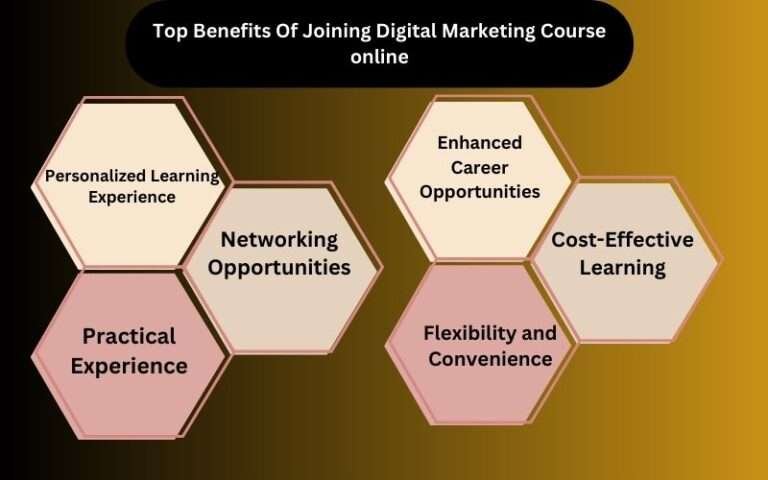Home » Top 7 Benefits Of Joining Digital Marketing Course online
Top 7 Benefits Of Joining Digital Marketing Course online

Benefits Of Joining Digital Marketing Course Online
By 7 Star Institute of Digital Marketing
In today’s fast-paced digital era, having a robust online presence is essential for businesses and professionals alike. One of the most effective ways to achieve this is through digital marketing. The 7 Star Institute of Digital Marketing offers comprehensive digital marketing course online courses that can equip you with the skills needed to thrive in this dynamic field. Among the best online digital marketing programs, their courses stand out due to their quality and depth of content. Here are the key benefits of joining a digital marketing course online.
Enhanced Career Opportunities
Digital marketing is a rapidly growing field with a high demand for skilled professionals. According to a report by LinkedIn, digital marketing is among the top 10 most in-demand jobs. By completing an online course, you can enhance your resume and increase your chances of securing lucrative job opportunities.
Cost-Effective Learning
Online courses are generally more affordable compared to traditional in-person classes. You save on commuting, accommodation, and other associated costs. Additionally, the 7 Star Institute of Digital Marketing offers flexible payment plans and financial aid options to make learning accessible to everyone.
Flexibility and Convenience
One of the most significant advantages of online learning is the flexibility it offers. You can learn at your own pace and on your schedule. This is particularly beneficial for working professionals who need to balance their studies with their job responsibilities.
Access to Latest Industry Tools and Techniques
Digital marketing is a field that is constantly evolving. Online courses provide you with up-to-date information on the latest tools, techniques, and best practices. The 7 Star Institute of Digital Marketing ensures that its curriculum is always current, reflecting the latest trends and technologies in the industry.
Networking Opportunities
Joining an online course allows you to connect with peers, instructors, and industry professionals from around the world. This can be invaluable for building your professional network and opening doors to new opportunities. The 7 Star Institute of Digital Marketing offers a vibrant online community where students can interact, share knowledge, and collaborate on projects.
Practical Experience
Theoretical knowledge is essential, but practical experience is equally important. best online digital marketing programs often include real-world projects, case studies, and hands-on exercises that allow you to apply what you’ve learned in a practical setting. This experiential learning approach helps you build a strong portfolio that can impress potential employers.
Personalized Learning Experience
Online courses often offer personalized learning experiences tailored to your needs and goals. You can choose from a variety of modules and specializations, focusing on areas that interest you the most. The 7 Star Institute of Digital Marketing provides best online digital marketing programs and personalized mentorship and support to help you achieve your career objectives.
The Digital Marketing Course in India

In the competitive landscape of today’s business world, digital marketing skills have become essential for professionals looking to advance their careers and for businesses aiming to expand their online presence. If you’re seeking to gain expertise in digital marketing, the 7 Star Institute of Digital Marketing offers one of the best courses available in India. Let’s delve into what digital marketing entails and why the 7 Star Institute stands out.
What is Digital Marketing?
Digital marketing refers to the use of digital channels, platforms, and technologies to promote products, services, or brands to a target audience. It encompasses a wide range of activities designed to engage potential customers and drive conversions through online mediums. Digital marketing leverages the power of the internet to reach consumers where they spend much of their time online.
Key Components of Digital Marketing
Search Engine Optimization (SEO): The practice of optimizing website content to rank higher in search engine results pages (SERPs) and increase organic traffic.
Content Marketing: The creation and distribution of valuable, relevant content to attract and engage a target audience. This can include blog posts, videos, infographics, and more.
Social Media Marketing: Using social media platforms like Facebook, Instagram, Twitter, and LinkedIn to promote products, engage with customers, and build brand awareness.
Email Marketing: Sending targeted emails to prospects and customers to nurture relationships, promote products, and drive sales.
Other Key Components
Pay-Per-Click (PPC) Advertising: A model of online advertising where advertisers pay each time a user clicks on one of their ads. Google Ads and Facebook Ads are popular platforms for PPC campaigns.
Affiliate Marketing: Partnering with other businesses or individuals to promote products or services in exchange for a commission on sales generated through their referral.
Influencer Marketing: Collaborating with influencers—individuals with a significant online following—to promote products or services to their audience.
Analytics and Reporting: Using tools like Google Analytics to measure the performance of digital marketing campaigns and make data-driven decisions.

Choosing the 7 Star Institute of Digital Marketing?
The 7 Star Institute of Digital Marketing is renowned for offering best online digital marketing programs and a comprehensive and industry-relevant digital marketing course in India. Here are some compelling reasons to choose their program:
Industry-Expert Faculty: The institute boasts a team of experienced instructors who are experts in various facets of digital marketing. They bring real-world insights and practical knowledge to the classroom, ensuring that students receive top-notch education.
Comprehensive Curriculum: The course covers all essential aspects of digital marketing, from SEO and content marketing to PPC and social media strategies. This holistic approach ensures that students gain a well-rounded understanding of the field.
Hands-On Training: The 7 Star Institute emphasizes practical learning through hands-on projects, case studies, and real-world simulations. This experiential approach helps students apply theoretical knowledge to real-world scenarios, enhancing their problem-solving skills.
Flexible Learning Options: Recognizing the diverse needs of students, the institute offers flexible learning options, including online courses that can be accessed from anywhere in India. This flexibility is ideal for working professionals and those with busy schedules.
Certification and Recognition: Upon completing the course, students receive a certification that is widely recognized by employers in the industry. This credential adds significant value to your resume and can boost your career prospects.
Placement Assistance: The institute provides robust placement assistance, helping students connect with potential employers and find job opportunities in the digital marketing field.
Networking Opportunities: Students have the chance to network with peers, instructors, and industry professionals. This can open doors to new opportunities and collaborations, enhancing your professional network.
Continuous Learning: The field of digital marketing is ever-evolving, and the 7 Star Institute ensures that its curriculum is regularly updated to reflect the latest trends and technologies. This commitment to continuous learning ensures that students stay ahead of the curve.
Types of Jobs Available After Doing a Digital Marketing Course
Completing a digital marketing course, especially best online digital marketing programs from a reputed institution like the 7 Star Institute of Digital Marketing, opens up a plethora of job opportunities across various industries. Digital marketing skills are in high demand, and professionals with these competencies can pursue diverse roles. Here are some of the key types of jobs available after completing a digital marketing course
Digital Marketing Manager
Role: A Digital Marketing Manager is responsible for planning, executing, and overseeing online marketing strategies. This includes managing campaigns across various digital channels such as social media, email, SEO, and PPC.
Key Responsibilities
- Develop and implement digital marketing strategies.
- Manage digital marketing budgets.
- Analyze campaign performance and optimize for better results.
- Coordinate with content creators, designers, and other marketing team members.
Skills Required: Strong analytical skills, project management, proficiency in digital marketing tools, and leadership abilities.
SEO Specialist
Role: An SEO Specialist focuses on improving a website’s visibility on search engines. This involves optimizing website content, structure, and other factors to achieve higher rankings in search engine results pages (SERPs).
Key Responsibilities:
- Conduct keyword research and analysis.
- Optimize website content for search engines.
- Monitor and report on SEO performance using tools like Google Analytics and SEMrush.
- Implement link-building strategies.
Skills Required: In-depth understanding of search engine algorithms, proficiency in SEO tools, analytical skills, and attention to detail.
Content Marketing Specialist
Role: A Content Marketing Specialist creates and manages content that attracts, engages, and converts target audiences. This role involves producing various types of content, including blog posts, videos, infographics, and more.
Key Responsibilities:
- Develop content strategies aligned with marketing goals.
- Create high-quality, engaging content for various platforms.
- Collaborate with designers, writers, and other team members.
- Analyze content performance and make data-driven improvements.
Skills Required: Excellent writing and editing skills, creativity, understanding of SEO, and knowledge of content management systems (CMS).
Social Media Manager
Role: A Social Media Manager is responsible for managing a company’s social media presence. This includes creating content, engaging with followers, and analyzing performance metrics to enhance social media strategies.
Key Responsibilities:
- Develop and implement social media strategies.
- Create and schedule posts across various social media platforms.
- Engage with followers and respond to comments and messages.
- Analyze social media metrics and adjust strategies accordingly.
Skills Required: Strong communication skills, creativity, proficiency in social media tools, and understanding of social media algorithms.
PPC Specialist
Role: A Pay-Per-Click (PPC) Specialist manages paid online advertising campaigns. This role involves creating and optimizing ads on platforms like Google Ads, Bing Ads, and social media networks to drive targeted traffic.
Key Responsibilities:
- Plan and execute PPC campaigns.
- Conduct keyword research and bid management.
- Monitor and optimize ad performance.
- Analyze campaign data and report on key metrics.
Skills Required: Analytical skills, understanding of PPC platforms, ability to manage budgets, and proficiency in tools like Google Ads and Microsoft Advertising.
Email Marketing Specialist
Role: An Email Marketing Specialist designs and implements email marketing campaigns to engage with customers and drive conversions. This involves creating email content, segmenting email lists, and analyzing campaign performance.
Key Responsibilities:
- Develop email marketing strategies.
- Create and send email campaigns.
- Segment email lists and personalize content.
- Track and analyze email performance metrics.
Skills Required: Strong writing skills, understanding of email marketing platforms, ability to analyze data, and knowledge of email best practices.
Analytics Specialist
Role: An Analytics Specialist collects and analyzes data from various digital marketing channels to provide insights that guide marketing strategies. This role involves using analytics tools to track performance and make data-driven decisions.
Key Responsibilities:
- Monitor and analyze website traffic and user behavior.
- Generate reports on key performance indicators (KPIs).
- Provide insights and recommendations based on data analysis.
- Collaborate with other marketing team members to optimize campaigns.
Skills Required: Proficiency in analytics tools like Google Analytics, strong analytical skills, attention to detail, and ability to interpret data.
Influencer Marketing Manager
Role: An Influencer Marketing Manager coordinates with influencers to promote products or services. This role involves identifying suitable influencers, negotiating collaborations, and managing campaigns.
Key Responsibilities:
- Identify and reach out to potential influencers.
- Negotiate collaboration terms and manage relationships.
- Track influencer campaign performance.
- Ensure brand alignment and compliance.
Skills Required: Strong communication skills, understanding of social media trends, negotiation skills, and ability to manage relationships.
Affiliate Marketing Manager
Role: An Affiliate Marketing Manager oversees a company’s affiliate marketing program, which involves partnering with external websites or individuals to promote products or services in exchange for a commission.
Key Responsibilities:
- Develop and manage the affiliate marketing program.
- Recruit and onboard new affiliates.
- Monitor affiliate performance and optimize strategies.
- Ensure compliance with affiliate marketing policies.
Skills Required: Strong relationship-building skills, understanding of affiliate marketing, analytical skills, and proficiency in affiliate marketing platforms.
E-commerce Specialist
Role: An E-commerce Specialist focuses on driving sales and conversions on e-commerce platforms. This role involves managing online product listings, optimizing the user experience, and implementing marketing strategies to boost sales.
Key Responsibilities:
- Manage product listings and inventory on e-commerce platforms.
- Optimize the online shopping experience for customers.
- Implement marketing strategies to increase sales.
- Analyze e-commerce performance metrics.
Skills Required: Knowledge of e-commerce platforms, strong analytical skills, understanding of digital marketing strategies, and attention to detail.
Contact Us
We are here to help you take the first step towards mastering digital marketing. Apply for our assessment test and if you have questions about our courses, need career advice, or want to know more about our institute, feel free to reach out to us. Our dedicated team in SSIDM is ready to assist you with any inquiries you may have.
An online digital marketing course typically covers a wide range of topics, including search engine optimization (SEO), social media marketing, content marketing, email marketing, pay-per-click (PPC) advertising, affiliate marketing, web analytics, and mobile marketing. Some courses may also include hands-on practice with tools like Google Analytics, Facebook Ads, and others.
Yes, most online digital marketing courses are designed for beginners as well as professionals looking to enhance their knowledge. Courses often start with fundamental concepts and gradually introduce more advanced strategies, making them accessible for people with little to no prior experience.
Yes, most online digital marketing courses offer a certification upon completion. This certificate can be added to your resume and shared on professional networks, helping demonstrate your knowledge and skills to potential employers or clients.

